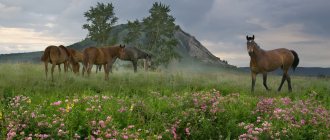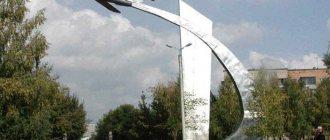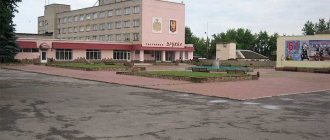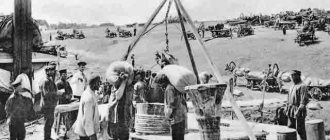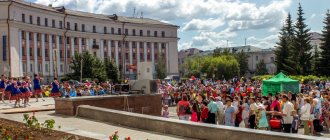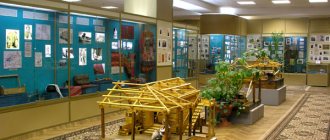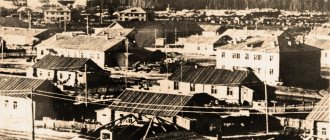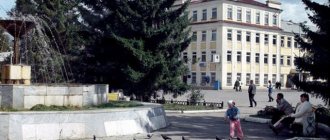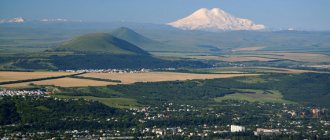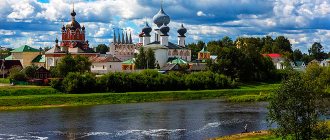Mariinsk is one of the oldest cities in Kuzbass. It is second in importance behind Novokuznetsk. You can find Mariinsk on the map of Russia on the Kiya River, 178 kilometers from Kemerovo, the capital of the region.
Its history is quite ancient. It was first mentioned in the seventeenth century. The emergence and development is associated with the Moscow-Siberian tract, and then with the discovery of placer gold deposits. In this regard, the population grew so quickly that in 1856 it acquired the status of a city and in honor of Empress Maria Alexandrovna it was renamed from Kiysk to Mariinsk in 1857.
At first, gold mining, agriculture, transportation, and trade developed here. By the beginning of the twentieth century, a number of small industrial enterprises had opened: brick factories, soap factories, tanneries, as well as one pottery factory and one brewery each. Now it is an agricultural area. The economy is represented by such sectors as:
- Liquor and vodka;
- Road construction;
- Railway.
You can get to know the city in absentia using a satellite map of Mariinsk.
Routes on the map of Mariinsk. Transport infrastructure
Mariinsk is a large railway junction (Dorozhnaya Street 1, in the city center) on the Trans-Siberian Railway. Belongs to the Krasnoyarsk Railway. The station is a junction station in terms of current flow in different directions, so locomotives change here, and passenger trains stop for 20-25 minutes. Electric trains also run from the station to Taiga. There is a locomotive depot and a luggage compartment.
The passage of the Federal Highway P255 “Siberia” and the highway P 400 from Tomsk allows for wide road connections between Mariinsk and different regions of Russia.
The presence of a bus station (next to the railway station), a convenient schedule of departure and arrival of intercity buses ensures constant and reliable communication with both settlements of the Kemerovo region and such large cities of Siberia as:
- Kemerovo;
- Novosibirsk;
- Tomsk;
- Krasnoyarsk
City public transport is represented by buses and minibuses that provide connections between city districts.
How much does it cost to go to Mariinsk
Let's calculate how much a trip to Mariinsk will cost. We will take into account everything: travel, accommodation, and food.
Food costs
Mariinsk is a small town, which makes it quite affordable to visit. It’s quite possible to get a set lunch for 300-400 rubles. Cozy cafes with homemade, high-quality food will not leave you hungry and at the same time will not empty your wallet.
How to get
Mariinsk has a railway and bus station. Based on this, you can get there in two ways.
- The closest major center to Mariinsk is the city of Kemerovo, located approximately one hundred and fifty kilometers from the museum city. The journey by car from Kemerovo to Mariinsk will take two hours, by bus – about three and a half. Ticket price is on average 350 rubles.
- And, of course, a passing train from Moscow: 3 trains go to Mariinsk - one of them is the famous Rossiya train from Moscow to Vladivostok. A one-way fare will cost approximately 4,500 rubles.
Costs for overnight stay
There are several hotels in Mariinsk, at varying distances from the center. The cost of a room ranges from 600-3500 rubles. As an option - an apartment for daily rent, the average cost per day is 1200 rubles.
Sights of the city of Mariinsk
The city has preserved its historical layout: stone and wooden buildings give an idea of the culture of the nineteenth century. There are more than a hundred historical and cultural monuments here. After visiting it, you can visit interesting places:
- St. Nicholas Church;
- Chapel of the Great Martyr Anastasia the Pattern Maker;
- Memorial to the victims of Siblag , dedicated to the repressed and exiled;
- House-museum of the famous Russian writer Viktor Chivilikhin , who was born in this city;
- Museum “Birch Bark of Siberia” , where you can admire various products made from birch bark: pieces, plates, boxes, boxes, chests, dolls, bast shoes, made by Siberian craftsmen;
- Mariinsky Museum of Local Lore , where historical materials, archaeological finds, and antiquities are collected;
- Bread Museum , which has a model of a Russian oven, wooden baking items, interesting material about the history of bread;
- Monument to Empress Maria Alexandrovna , located near the city library;
- Interesting monument to potatoes.
Natural attractions of the Mariinsky district of the Kemerovo region
This northern region is located in a flat area with many rivulets and streams. The largest river, Kiya, which flows through several areas, has several floodplain swamps and lakes. Kiya is the main source of fresh water for many regions of the Kemerovo region. On the left bank of the river is the city of Mariinsk, the central settlement of the region. In these places there are deposits of peat, sand and clay. Once upon a time, gold sand was found here.
The flora of the Mariinsky district is diverse. Coniferous and deciduous trees grow here. Among the coniferous species, pine predominates, but there are also spruce, cedar, larch and fir. Deciduous species include birch and aspen, but the latter type is more common. There are many types of shrubs - mountain ash, bird cherry, elderberry, raspberries, currants and many others. In spring, when all the plants begin to bloom, everything is filled with aroma and beautiful flowers.
The fauna is also very diverse. There are moose, predators, rodents, and commercial fur-bearing animals. Wood grouse, black grouse, owls and other birds live in the taiga zone. Near the city of Mariinsky there is a natural reserve Archekas. Residents of the city come here to pick mushrooms; there are a lot of them here. These birch forests have almost sterile air, there are many streams and swamps. There are many plants growing in the reserve and animals that are already listed in the Red Book. Only here the unique black birch grows. Elk and roe deer, badgers, hares, foxes and many other animals live in these places. The Archekassky reserve is also of interest to geologists.
Citizens and guests love to visit the Mariinsky Reservoir to spend time and relax. The ecology of the Mariinsky district is in excellent condition; there are no harmful enterprises or factories nearby. At the reservoir you can go fishing, swim and sunbathe. The surrounding forests are rich in mushrooms, strawberries and blueberries, and there are also raspberries. Near the reservoir there are several springs with excellent clean water. The Maksunovsky spring is well equipped, there are comfortable steps with railings, and a small gazebo has been built above the spring, protecting the spring from the sun and rain. The Spring of Lovers also deserves the attention of those who want to get some clean water. You can also get to it along clean, comfortable paths. Both sources are surrounded by picturesque nature. It is known that these springs were cleaned and developed by Mariinsk schoolchildren.
To see the natural attractions of the Mariinsky district, you just need to leave the city.
Main streets of Mariinsk
The main streets in the city are:
- Dorozhnaya street. Intersects with Lenin and Sergei Lazo streets. There is a city bus station on it;
- Lenin Street , intersecting with Rabochaya Street. On Lenin Street there is a city park of culture and recreation, a local history museum, and a large shopping center;
- 50 Let Oktyabrya Street intersects with Lenin, Kotovsky streets and a number of small streets. Here you can find a Gasoil gas station, and the Solnechny residential complex is also located on it;
- Palchikova Street is the longest highway in terms of length. It borders on Demchenko Street. The central city hospital is located here.
A map of Mariinsk with streets will allow you to get acquainted with other areas of the city. You can easily find the building you need on a map of Mariinsk with houses.
Mariinsk
(Kemerovo region)
OKATO code:
32422
Founded:
1698
City since:
1856 City of district subordination (Mariinsky district, Kemerovo region)
Center:
Mariinsky district
The city was formerly called:
| Kiyskoe | 1698 | 1857 |
| Telephone code (reference phone) | |
| 38443***** | 22-3-23 |
Deviation from Moscow time, hours:
4
Geographic latitude:
56°13′
Geographic longitude:
87°45′
Altitude above sea level, meters:
130 Sunrise and sunset times in the city of Mariinsk
Economy and industry of Mariinsk
Mariinsk is a small city, so it does not have large economic infrastructure. Previously there were:
- Meat processing plant;
- Timber processing plant;
- Sewing and knitting factories;
- Metal products plant;
- Furniture factory.
Now there is only:
- Alcohol plant;
- Distillery;
- Bakery;
- Road repair and construction department.
Rural tourism, small and medium-sized businesses, and trade are developing.
Revival of Mariinsk Merchant
For a long time, Mariinsk celebrated City Day, starting from 1856, when, by Decree of Emperor Alexander II, the village of Kiyskoye received the status of a district town. But to calculate the chronology of populated areas, they also use another approach: from the time of the first evidence of settlement in a given specific place. They did the same in Mariinsk. Historians, local historians, and the city’s public decided to take 1720 as the starting point, which dates to the first documentary mention of Mariinsk, in particular, of the Nikolsky churchyard.
“Near Kiya in 1720, in a Tatar village, a church was built, where Mariinsk is located. The famous explorer of Siberia Gerhard Miller speaks about this in his work “Description of the Tomsk district of the Tobolsk province.”
He writes that in the Kurchukov volost (in the place of present-day Mariinsk) a church was built, and it bears the name Nikolskaya, says Sergei Sheshukov, director of the Historical Mariinsk Museum-Reserve. – On September 24, 2021, at the academic council of the Institute of History and International Relations of KemSU, it was decided to “consider it possible to include the date of the founding of the village of Kiiskoye in a set of events dedicated to the celebration of the 300-year industrial development of the Kuznetsk coal basin, taking into account the role of the village of Kiiskoye and Mariinsk in the development of gold mining, trade and transport infrastructure.”
Given the name of the Empress
The traditions of Mariinsk are very rich. On July 22, 1857, the village of Kiiskoye was reorganized into the city of Kiisk. Soon, the Governor-General of Western Siberia turned to the Siberian Committee with a request to rename Kiysk to Alexandrovsk or Mariinsk. Alexander II settled on the second option, immortalizing the name of his wife.
A center of gold mining and trade, Mariinsk developed rapidly, especially in the 19th century. Trade in a variety of goods flourished here. The largest shops and shops were located on Bolshaya Moskovskaya Street. Merchants of Mariinsk also had industrial enterprises. It is known that Trifon Timofeevich Savelyev, who was also the first mayor of Mariinsk, owned a brewery, a soap factory, and a fruit water factory. CM. Guryevich had a tanning and rolling production. He also built a city bathhouse, which has survived to this day. The merchant Chebotarev had cars and cargo transport, so he was engaged in the transportation of passengers and cargo. At L.D. Preysman had a printing house in Mariinsk - the only one at that time in the entire territory of modern Kuzbass. Accounting books, a statistical collection “Issues of the Mariinsky District”, advertising, posters and much more were published there. In particular, Preysman's printing house became famous for the almanac "Okroshka" produced.
The largest grain traders in Mariinsk at the end of the 19th – beginning of the 20th century were the merchants Chernolovsky, Gurevich, Minenko, and Kukhterin. Distillation was closely connected with the grain trade. The merchant Cherdyntsev was considered the largest wine merchant in Mariinsk. It is noteworthy that merchants constantly had to confirm their membership in the guild; they provided information about their income to the city public administration.
Merchants and patrons of the arts
Charity was an integral feature of the Mariinsky merchants. Researchers of the history of the city note that there were several reasons for this. For example, religiosity, but at the same time vanity. After all, for the largest donations, the government awarded merchants with ranks and titles; they could occupy major positions in local government.
First of all, merchants donated to church needs. In 1824, a stone cathedral was built in Mariinsk in honor of St. Nicholas of Myra. The cathedral's bells are cast from copper and covered with a layer of gold. It was a gift to the city from the merchant Yudalevich, as evidenced by the engraving on the bell. And in 1914, again, the merchants erected a bust of Alexander II in front of the cathedral, dedicated to the 50th anniversary of the abolition of serfdom.
Merchants in Mariinsk built and supplied a cemetery church, a Polish church and a Jewish synagogue. In addition, churches and chapels were also built in places remote from the city, where merchants were engaged in crafts and trade.
Large gold miner Pyotr Savelyev donated five thousand rubles to St. Nicholas Cathedral. He was also a member of the board of trustees of the Mariinsky Girls’ Gymnasium and took on all its expenses; Savelyev allocated funds to both the men's educational institution and the vocational school of Mariinsk.
Thanks to the merchants, the first cinema in Kuzbass appeared in the city - “Furor”. At first, a whole group of entrepreneurs wanted to open it, but in the end the Manusovich brothers did it single-handedly. Thanks to merchants, the first library society was opened in Mariinsk in 1901. In winter, the merchants set up a skating rink in the city garden, and in summer - playgrounds for children and adults. Paths were laid out in the garden for members of the cyclist society, and a swimming pool with a swimming school was set up on the Kiya River.
In response, the Mariinsk authorities hung portraits of philanthropists in the city council building, a public bank, and educational institutions were named after them.
As local historians clarify, it was thanks to the initiative and efforts of the Mariinsky merchants that such innovations as stone houses, a women's gymnasium, a printing house, a fire department, a library society, a firefighting society, and a cinema appeared in our region.
Traditions today
Director of the Historical Mariinsk Museum-Reserve Sergei Sheshukov emphasizes that the city will maintain the continuity of merchant traditions.
“We decided to make the theme of merchants central to our city; it can be branded and attract tourists and guests. This year we plan to celebrate the anniversary with small historical installations on the streets of the city to create a festive mood. We invite entrepreneurs to participate. All this can be viewed while walking. And starting next year, on August 1, we will celebrate the Day of Siberian Merchants,” says Sergei Vasilyevich. – We are also now working on organizing the “Siberian Merchant Assembly”, which will include the descendants of the Mariinsky merchants, major philanthropists of the city and region. We have done a lot of research and established connections with the descendants of Mariinsky merchants in Russia and abroad.”
This year a series of postcards dedicated to Mariinsk was released. In addition, the museum-reserve will be preparing an updated exhibition dedicated to the merchants. It will be filled with living stories about merchants - how they lived and worked here.
